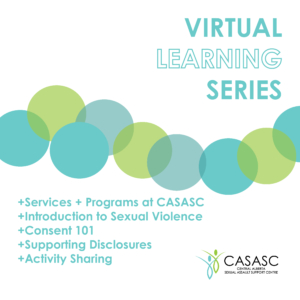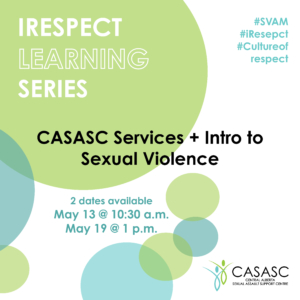CASASC is seeking to fill the position of Educator – Casual
The job details are as below:
Position: Educator
Reports to: Education Program and Community Relations Manager
Number of positions: 1
Job Type: Casual
Location: Red Deer, AB & occasional daily travel to schools within Central Alberta
Hours per week: As and when required.
Hourly rate: Determined based on education and experience
Anticipated Start Date: ASAP
Position Summary
Reporting to the Education Program & Community Relations Manager, the Educator is an integral part of the Education team, responsible to support CASASC’s goal to increase the personal safety awareness through education and empowering them to prevent sexual violence.
Based on CASASC’s mission and vision, the Educator acts as a liaison between CASASC, Community, Schools, and Organizations, focusing on delivering education programs to create awareness and prevention strategies among K-12 students, adults, parents, professionals, and other individuals of the community.
The Educators are also expected to represent CASASC in a professional manner, work according to the missions and vision of CASASC and build community relations including (but not limited to) conducting community visits, attending meetings, staffing booths, and events organized by partner agencies and other organizations within Central Alberta.
The Educator is expected to have full knowledge of, and to follow the Philosophy, the Guidelines for Personnel Policies & Practices, and the Policies & Procedures of the CASASC while upholding our mission, vision, and values.
Qualifications and skills:
- Bachelor’s degree in Education with 1-2 years of related experience. A combination of education and experience may also be considered for the position.
- Must have knowledge and understanding of sexual violence prevention and intervention strategies. Experience of working in a non-profit would be considered as an asset.
- Must have excellent communication, interpersonal, and public speaking skills.
- Experience of working in, facilitating, or teaching in a classroom and/or group settings.
- Excellent verbal and written communication skills in English is essential.
- Ability to work as a collaborative team member as well as an independent key player with minimum supervision.
- Ability to build rapport with children and youth from Kindergarten to Grade 12
- Ability to relate to adults and professionals for the successful delivery of education and awareness information
- Superior time management skills, and the ability to prioritize tasks with minimal supervision
- Proficient using computers and presentation equipment (incl. basic troubleshooting) of virtual and presentation platforms (zoom, google meet, projector, and sound setup)
- Proficient in Windows, MS-Office, Internet, email & social media is essential.
- Availability to work occasional evenings/weekends for special events, be able to travel within Central Alberta to fulfil job responsibilities.
- Should have professional, responsive, and positive work attitude
- Must be able to submit a clear Criminal Record Check with Vulnerable Sector Screening.
- A valid Driver’s License with a satisfactory Driver’s abstract is essential.
- Should be able to fulfil the physical demands of the job such as the ability to lift at least 20lbs, climbing the stairs while carrying supplies, above-shoulder lifting, overhead reaching, frequent use of office equipment, sitting for longer periods and other relevant physical tasks.
Responsibilities:
- Plan, prepare and deliver all CASASC education programs by providing interactive and dynamic presentations, and education material by using age-appropriate methods and activities, either in-person or virtual; in schools and communities throughout the CASASC service region.
- Design and deliver tailored education programs as/if requested by the schools, community and/or other agencies within CASASC’s service region.
- Participate in community public education forums and/or events to promote the awareness of sexual violence issues & CASASC services. (Attending interagency meeting, staffing booths and events, conducting community visits)
- Update education programs statistics in the tracking program and submit monthly/quarterly/annual reports to facilitate grants and internal requirements.
- Conduct regular research and keep education programs’ content up-to-date related to CASASC’s prevention education such as (but not limited to) sexual violence, teen dating, consent, healthy relationships, and any other program that supports CASASC’s mission and vision.
- Ensure that Education department’s events and programs are posted on CASASC’s social media platforms by submitting relevant and timely information to the Education Program and Community Relations Manager. In the absence of the Manager, work in direct collaboration with the Communications Manager to ensure the same.
- Keep the schools and community contact list up-to-date. Stay in regular contact with the schools and community through different mediums to ensure the regular delivery of education programs to the target audience.
- Communicate with internal departments of the organization and share departmental updates on regular basis.
- Connect with newly hired employees of the organization and briefly introduce them to the operations of Education Department.
- Design tailored education programs to cater the needs of diverse community including the Indigenous Communities.
Team Responsibilities/Staff Development:
- Adheres to the values and guiding principles, policies, and procedures of CASASC and supports the strategic direction of the organization.
- Participates in staff meetings and offered trainings.
- Acts as a responsible team member by demonstrating initiative, completing work duties, and by maintaining clear, direct, and respectful communication with everyone in the work environment.
- Proactively stays current with best and emerging practices in the field. Participates regularly in the staff development activities according to a learning and development plan identified through supervision and the on-going performance review process.
- Provides back-up coverage to CASASC as required in response to the needs and priorities of the organization which includes other duties as and when assigned.
Organizational Responsibilities:
- Maintains agency confidence and protects operations by keeping information confidential.
- Represents CASASC in a professional manner.
- Maintains on-going positive public relations with external agencies, groups, and individuals (if required).
- Uses appropriate mechanisms for resolving internal agency problems.
- Maintain professional relationship with internal and external stakeholders.
How to Apply:
CASASC is an equal opportunity employer, and we value the importance of diversity, dignity, and worth of every individual in the workplace.
Email your resume and cover letter to education@casasc.ca by Dec 21, 2021. Mention the position in the subject line.
We thank all applicants for their interest, however, only short-listed candidates will be contacted for interview.
Application deadline: Ongoing




